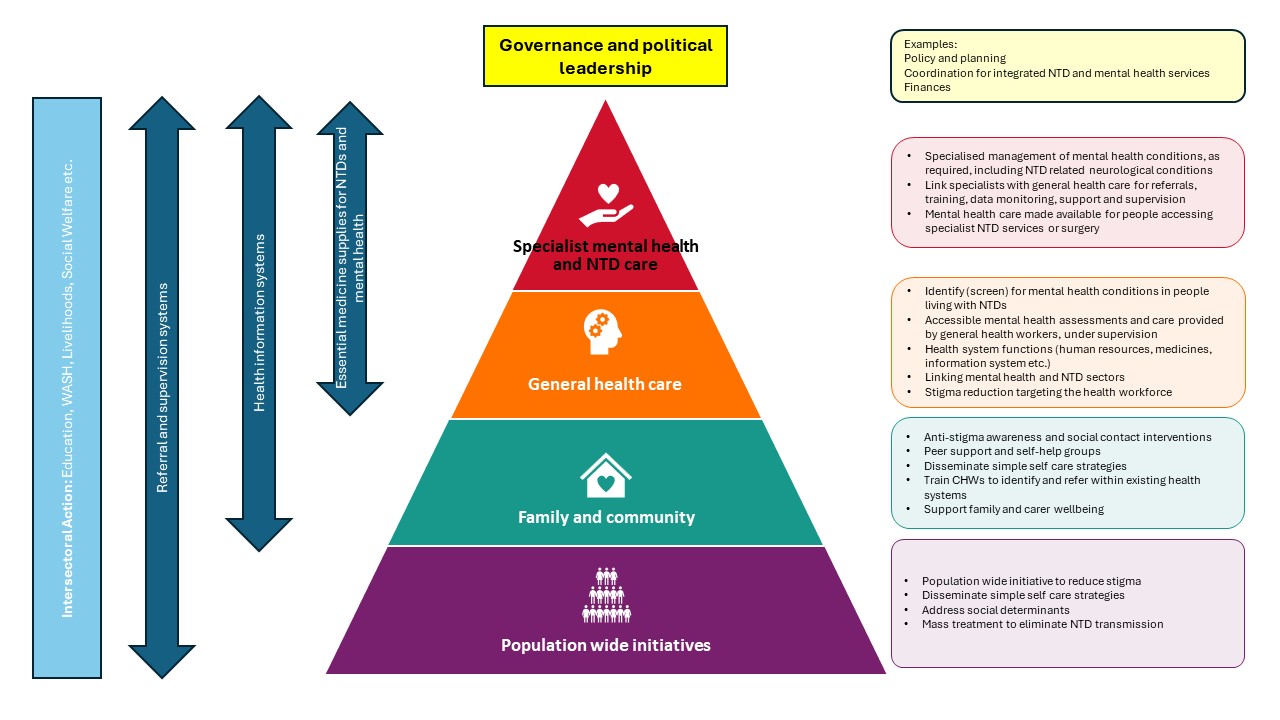Essential Care Package to address Mental Health and Stigma for persons with Neglected Tropical Diseases
Introducing the Essential Care Package to address Mental Health and Stigma for persons with Neglected Tropical Diseases and related materials
Addressing the negative impacts of NTDs, stigma and mental health conditions requires a holistic, person-centred approach which addresses the social, psychological and socio-economic factors. This requires systematic, multi-sectoral collaboration.
To support this, the WHO and the NTD NGO Network (NNN) cross-cutting group on Disease Management, Disability and Inclusion (DMDI) developed the Essential Care Package (ECP) to address mental health and stigma for persons affected by NTDs.
The ECP includes evidence-based mental health interventions, drawn from the WHO guidelines for mental, neurological, and substance use disorders and operationalises the WHO’s mental health of people with Neglected Tropical Diseases- towards a person-centred approach. Crucially, the ECP includes evidence-based interventions to reduce population health-related stigma and discrimination, to address the stigma experienced both by people living with mental health conditions, and by people living with NTDs.
The framework provides health service leaders a summary of evidence-based interventions for the prevention of poor mental health and promotion of (good) mental health; for the identification and assessment of mental health conditions in people living with NTDs; and for the management (treatment) of mental health conditions; as well as of effective stigma reducing interventions.
The Essential Care Package (ECP) to address mental health and stigma for persons affected by NTDs is largely focused at general health care levels (inclusive of primary care, secondary care and community levels) and provides multiple stakeholders with guidance on the competencies (i.e. attitudes, knowledge and skills) required to implement a holistic, whole-of-society approach to managing stigma and mental health for people living with NTDs. This includes specific recommendations for action by people living with NTDs, their families and caregivers, health leaders and policy makers, health and other sector workers, and community members.
Through the work of the DMDI mental wellbeing and stigma group, we have compiled a suite of resources for NTD programme managers and implementers to use to support the introduction and delivery of the ECP.
A generic manual to support delivery of the ECP, includes four key modules, including:
Master Trainer Manual 1 for NTD and mental health stakeholders within the health system to improve the management and support available to people affected by skin NTDs to develop their own country-specific materials to roll out training and implementation of enhanced integrated case management for NTDs. This manual includes:
- Guidelines for how to adapt the manual for use in different settings
- Actions to consider when implementing integrated case management for NTDs, mental health and stigma reduction
- An overview of case detection and integrated management of skin NTDs including mental health
- Proposed training cascade
- Introduction to human resource management
- Supervision tools to support case management of NTDs including mental health supervision
Mid-Level Health Worker Manual 2 for those based at the health facility, including all those who may come into contact with the persons affected by NTDs and those who supervise community health workers. This manual prepares health workers to diagnose, treat and manage NTDs affecting the skin, screen for mental illness, provide basic psychological support with links to mhGAP trained providers and refer complicated cases to secondary or tertiary healthcare facilities. This content includes:
- A facilitator’s guide for master trainers to use when facilitating this training
- A participant’s guide, which includes the following materials:
- Job aids for health workers to use to support case detection, management and referral of skin NTDs
- Case management clinical algorithm, including mental health component
- Basic psychological support for NTDs, including stigma awareness and example mental health referral pathway
- GAD 7 and PHQ9 screening tools for screening for common mental health conditions
- Diagnostic communication job aid
- Example NTD register including mental health indicators
- NTD Supervision tools, including mental health component
- Other facility level NTD related tools, e.g. laboratory SOPs etc.
Community Health Worker Manual 3 for community health workers (CHWs). This manual provides CHWs with the knowledge to support case detection for NTDs, and to provide look listen link support and referral for psychological support where necessary. This content includes:
- A facilitator’s guide for master trainers to use when facilitating this training
- A participant’s guide, which includes the following materials:
- CHW job aid about common NTDs
- Look listen link tool, including stigma awareness
- Other community level NTD related tools, e.g. community trigger and referral form
Peer Advocate, Traditional Healer, Faith Healer Manual 4 for use with persons affected who wish to become peer advocates, traditional healers and faith healers. This manual and related materials support these actors to be sensitized as part of NTD interventions and can be a key support in the identification and management of persons affected. This content includes:

